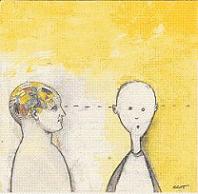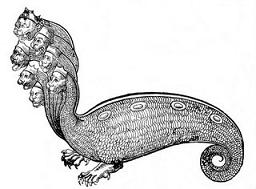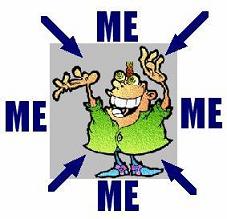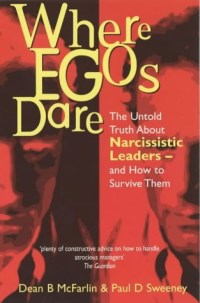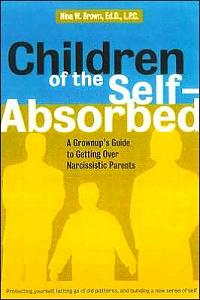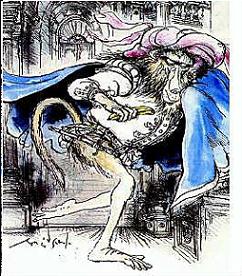Is He/She a Narcissist?- You're not Crazy.
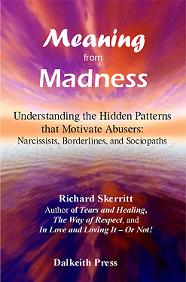 Is your partner a narcissist? You may not know how to tell, but even worse, you may be thinking that you are the crazy one. Narcissists work hard to distort our reality to make their reality feel safer.
Is your partner a narcissist? You may not know how to tell, but even worse, you may be thinking that you are the crazy one. Narcissists work hard to distort our reality to make their reality feel safer.So what is a narcissist? Someone who preens in front of the mirror all day in admiration? NOT! Ask yourself this: is your partner intensely angered by anything that seems to suggest that he or she might have a flaw? Narcissists will do anything, including brutalizing their own family, to maintain their own feeling that others see them as without any flaws. And, narcissists have extreme and illogical sensitivities, sometimes connecting the most minute observations with their intense fears of being seen as flawed. Narcissists will strain every muscle to meet their own "flawless" image, and demean or destroy anyone or anything who casts any doubt on this image. If you see this dynamic in your partner, family member, coworker, or friend, you are very probably dealing with a narcissist.
For many of us, struggling to live with this kind of abusive partner, the first handhold we need to grasp is that we are not crazy. Whether the person we live with has narcissistic personality disorder, borderline personality disorder, antisocial personality disorder/sociopathy, or alcoholism, people who suffer from these disorders have extreme emotions, which lead them to actions that can range from puzzling to brutal. Living with them is painful and confusing. Personality disorders are aptly named, because the minds of people who suffer from these disorders work differently than healthy people.
It is only by understanding how you and your partner function, how his or her personality disorder affects his or her behavior, and how you interact, that you can begin to really judge what is happening. To figure out what you should do, you need to understand your own emotions and how to handle the decisions you face. Meaning from Madness explains a disordered partner is written by a man who survived a violent relationship with a narcissistic/borderline/alcoholic wife and has been engaged helping others through these situations for the past 6 years.
Meaning from Madness: Understanding the Hidden Patterns that Motivate Abusers: Borderlines, Narcissists, and Sociopaths
by Richard Skerritt
ISBN: 1-933369-14-0
Extract:
They Spin our Reality: Disordered people can't deal with the reality of their behaviors. On some level they realize how hurtful they are, yet accepting this major flaw in themselves is just too painful. So disordered abusers spin our reality to make theirs less painful. One of the most common defense mechanism they use is projection. In projection, a characteristic of themselves that they find just too painful to accept is projected onto us. And the most frequently projected characteristic is mental illness. "I'm not a narcissist. You're the crazy one." Another common and difficult defense mechanism is blame shifting. It's your fault this happened because blah, blah blah blah...
After a while it becomes hard to distinguish what is real from what is being projected and what is being distorted. We begin to doubt our reality and question whether we're the crazy ones, or whether our disordered SO's (significant others) are really right about what they say.
The truth is, THEY'RE NOT RIGHT. But they feel better when they can get us to carry the burden of their illness and their behavior.
What's more, disorder people hide their problems very effectively. People with all of these personality disorders - narcissistic personality disorder, borderline personality disorder, and antisocial personality disorder - have serious maladjustments in coping with life. Thus, they live in emotional turmoil. They seek to present a very together appearance, hiding their disease from most people. It is only when we get into a close and private relationship with someone with these personality disorders that the abusive behavior comes out. And because their lives are wracked with emotional turmoil, there is a lot of pent-up emotion that can be focused on us. Yet those around us don't see it, causing us further confusion.
The different disorders have different underlying themes. People suffering from narcissistic personality disorder respond with extreme defensive actions to events which they feel threaten their perception as special and privileged. Similarly, those suffering with borderline personality disorder respond to some events with extreme fear of abandonment - events that would have little meaning to a healthy person. Those with antisocial personality disorder lack normal feelings of responsibility and compassion and thus have little motivation to restrain their reactions. And alcoholics can show any of these, while at the same time their natural inhibitions from hurtful behavior are suppressed by the intoxication.
All of this leads a lot of confusion for those of us unlucky enough to be in committed relationships with someone with a personality disorder. My own experience was with someone who probably would have barely diagnosed at her worst - and definitely not at her best - with borderline personality disorder. What I have learned, as I have begun helping people with broader experiences, is that much of what I learned about abuse and borderline personality disorder also applies to narcissistic personality disorder and even antisocial personality disorder.
Another thing I've observed over time is the link to alcoholism. AA and Al-Anon have a culture that treats alcoholism as a disease alone and apart. Thus, people getting support through these channels tend to think that there is nothing more to learn beyond alcoholism. At the same time, this approach leaves some things unexplained. They talk about "dry drunks" and problems that persist long after alcoholics get sober. Why is this so? If addictive use of alcohol is the problem, why don't things improve when the alcohol abuse stops?
The reality is more likely that alcoholism and other addictions, like pot/marijuana, prescriptions drugs, cocaine, etc, are the result of a personality disorder. In the case of my ex-wife, a mixed addictions to alcohol and prescription psych meds was the result of self-medication to deal with the emotional pain of her disorder. Addiction is extremely toxic, and greatly worsens the effects of a personality disorder. But if the substance abuse stops, the underlying personality disorder is still there.
Thus, understanding how a partner borderline personality disorder, narcissistic personality disorder, antisocial personality disorder, alcoholism, and substance abuse will interact with us is essential if we are to get a handle on our situations and our own lives. And to begin with, we have to realize that even though we are victims a prolonged distortion campaign and may feel very confused about things, WE ARE NOT CRAZY.

